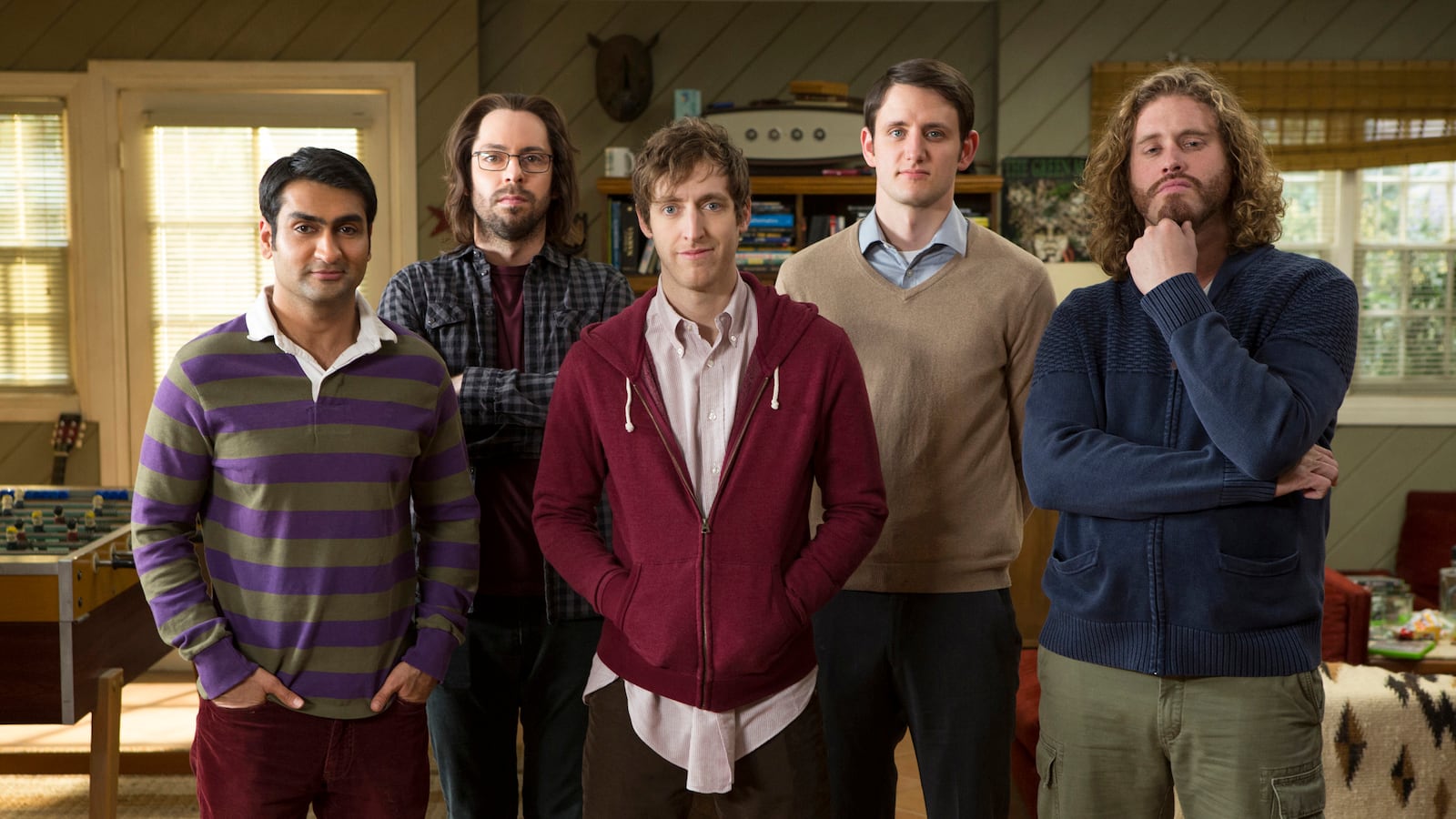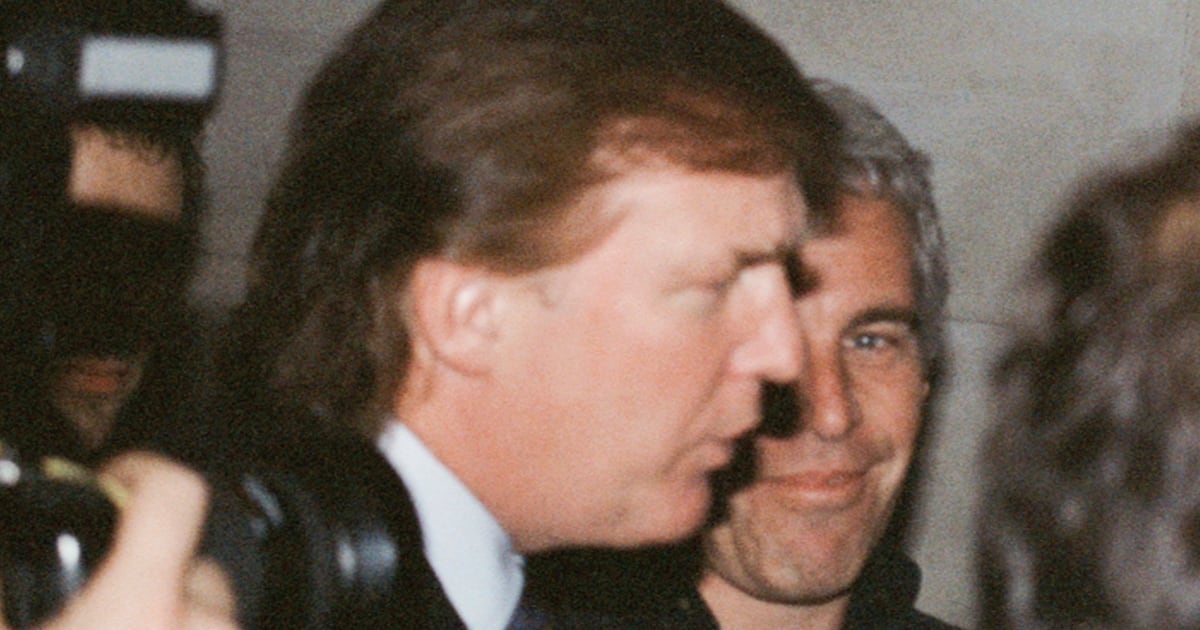“I love Goolybib’s integrated multi-platform functionality. Yeah!”

If you think that line is hilarious—especially when it’s the first thing a newly-minted twentysomething tech millionaire shouts after grabbing the mic from an unimpressed Kid Rock at Goolybib’s lame launch party—then you are going to get a huge kick out of Silicon Valley.
Actually, you’ll probably get a kick out of it either way.
Co-created by Mike Judge, the man behind Beavis and Butt-Head, King of the Hill, and Office Space, Silicon Valley, which premieres Sunday on HBO, follows the exploits of a mumbling programmer named Richard (a pitch-perfect Thomas Middleditch) whose compression algorithm Pied Piper ignites a bidding war between archrivals Gavin Belson, the CEO of a Google-like megacompany called Hooli, and David Gregory, a spacey, iconoclastic venture capitalist.
The plot itself isn’t particularly complex. Think Revenge of the Nerds meets Entourage. Will Richard sell his baby to Belson for $10 million? Or will he take $200,000 from Gregory in exchange for a 5 percent stake—and team up with his programmer pals to build Pied Piper into the next Facebook? If so, how?
The satire, on the other hand, is exquisite. At this point, the culture of Silicon Valley is so codified—and so absurd—that Judge and his team (co-creators John Altschuler and Dave Krinsky and co-showrunner Alec Berg) are able to skewer it simply by ripping real details from the headlines (or from their research) and inserting them directly into the show. There’s the famous graffiti artist hired to enliven Pied Piper’s garage (a la Facebook). There are the Hooli brainstorming sessions conducted atop a seven-person conference bike (a la Google). There’s even a send-up of Siri (a la Apple).
“Play John Lennon’s ‘Imagine,’” Belson says at one point.
“Cueing ‘John Wayne in a Mansion,’” replies the Siri clone. “Not found.”
“Fuck,” Belson snaps.
“Invalid command,” Siri snaps back.
The list goes on. Hilarity ensues.
To find out why Judge & Co. decided to skewer Silicon Valley, and how they went about doing it, we recently gave them a call. Judge and Berg were kind enough to take us behind the scenes—and to reveal which tech billionaire was the original inspiration for the show.
The Daily Beast: Silicon Valley is so ripe for satire that I’m surprised it hadn’t already been satirized like this. Tell me about the moment you first got the idea for the show.
Mike Judge: I was interested in this going back to 2000. I read an article about Paul Allen in Rolling Stone. Here was a guy who reminded me so much of programmers I knew in college and high school…but with billions of dollars. There was a part of the story where he was showing off his giant, elaborate home movie theater. He had some big ol’ remote control—but he couldn’t get anything to work.
At first, HBO and Scott Rudin asked me to do something about gamers. But I don’t know that world at all. So I said what about doing something about programmers?
Mike, you actually worked in Silicon Valley in the late 1980s. What’s changed? What’s stayed the same?
Judge: The personalities—the types—are really the same. What’s changed is that it’s easier to do a start up now. I worked for what could be considered a start up back then—it took a lot more money and more people to get going. Now five guys who program can pitch their company and get $100,000 from an incubator. There wasn’t as much of that going on when I was working there.
That directly plays into the show, which follows these five guys without much in the way of ambition or access who basically have 48 hours to start a company from scratch. It’s a very 2014 phenomenon.
Judge: Exactly.
Your protagonist, Richard, is a genius programmer whose insecure persona conceals a pretty confident inner core. Who or what is he based on? I know he’s not a 1:1 Mark Zuckerberg clone, for example. But which parts of which people did you borrow to create him?
Judge: We just looked at the quintessential programmer type. Definitely no 1:1, and no “he’s based on this guy or that guy.” But when Thomas Middleditch was first reading for the part, I felt like he was channeling my stepbrother, whom he’d never met. I have a stepbrother with, like, a perfect math SAT score. He now works for the mayor of New York running their incubator for tech companies. That’s when I knew we were on to something.
Silicon Valley is like self-parody at this point. Do you have a favorite detail—something you read about somewhere or discovered in your research—that you just imported directly into the show?
Alec Berg: Well, we started to notice that people kept using the phrase “making the world a better place.” And every time somebody would say it in earnest, it was one of those things where we’d be like, “Hmm. They sure do say that a lot.” It kind of became a running joke. It’s like this obligatory thing—like, if you’re thanking your wife or you’re winning an award, you’re expected to say, “We’re going to do this and do this—and make the world a better place.”
[Laughs]
Judge: One of the first incubators we go to, they bring out the first company and the guy pitches his whole platform or app, and then at the end, just like Alec is saying, he goes, “Oh, and making the world a better place.” Sort of as an afterthought.
Berg: There are tons of things where we’re keeping a file or sending each other links, like, “Holy shit. This is hilarious. We have to touch on this in the show in some way.”
Is there something that you weren’t able to work into this first season that you wish you could have and that you might in the future?
Berg: The Google Bus stuff flared up and became a national story after we had written the episodes and were shooting.
Judge: If there’s a second season that’s definitely something we’ll have fun with.
Berg: And the idea of a Tom Perkins character crusading for the rights of the rich seems like a very funny idea. They are a minority, after all. They’re only the 1 percent. [Laughs]
One of my favorite aspects of the show is the company names: Goolybib, Aviato, Hooli. Did you guys sit around spitballing them like the characters on the show, who at one point try to come up with a new name for Pied Piper? I imagine that was a fun writing session.
Berg: It was actually the least fun writing session.
[Laughs]
Berg: The problem is that any combination of random vowel sounds and syllables you can think of has already been trademarked.
Judge: We would sit there just, like, riffing as we were writing. “OK, and then this company Giddilywonk…” Nope, that’s taken. At one point we were going to have one of the writer’s assistants make a list of every spitballed company name we just vomited out.
Berg: It was crazy. Eventually there was a guy whose full-time job was to run clearances on things and just make sure we could say what we wanted to say. Toward the end, we finally just said, “OK, we need to come up with three company names here. I’m tired of coming up with a hundred and you telling me they don’t clear. Just make up a bunch of names, clear them, and just give me a list of names we can actually use.” It was exhausting. You could spend half a day coming up with shitty company names and none of them were usable.
So how did you arrive at Hooli?
Judge: The only reason we were allowed to use that was because it’s the name of a city in India. Hooli would not have cleared.
Wait, why? Because Hooli is already a company?
Judge: It is. There’s a company called that. It’s really crazy.
Berg: We couldn’t believe it. We went through a bunch of names for Gavin Belson’s compression company, Nucleus. The fact that Nucleus cleared…we were shocked. Because it’s actually an English word, and it kind of seems like something you would name a compression company—the very small core of something.
It made too much sense.
Berg: Again, we were shocked. But it was good, because the other 58 they said we could use were just utter garbage.
How have the actual denizens of Silicon Valley responded to the show? I’m assuming that you’ve screened some episodes for them.
Berg: We’ll tell you in a few days!
Judge: Eric Schmidt was in that first party scene, and he told us, “You know, I’ve been to this party.” He thought we’d really gotten it right. And so do our consultants, obviously.
Berg: We have a big screening tomorrow night up in Redwood City. I guess we’ll find out. Even though it’s a little too late to change anything. [Laughs] I hope it plays.
Judge: We’ll take an armored car.
On the flip side, were you worried that viewers who didn’t know all these hilarious Silicon Valley references might miss the jokes? That balance must have been difficult to strike.
Judge: I’m not too worried about that. Most of the people who seen the show and like it aren’t computer insiders. Whenever there’s anything technical going on, it’s not just a purely technical conversation. Usually it’s loaded with some kind of emotional content. The stakes are really big here. Richard turned down $10 million to build Pied Piper. Jared [Hooli’s pencil-necked business-development specialist] quit a high-paying job to do this. All of them have big stake in this, and it could be worth billions or it could be worth nothing. And that’s the reality in Silicon Valley. The technical stuff is just the backdrop. It doesn’t matter at all if someone hasn’t programmed. I think they’ll get it.
A broader question about comedy in general: it’s nice to see an actual satire on television for once. To me, it seems like most comedy these days is either about “random” pop culture allusions (Family Guy) or painfully awkward situations (Girls). Did you deliberately try to do something different?
Judge: Absolutely. We talked a lot about that when someone pitched something or had an idea. We’d say, “Why is that unique to this show and to this world?” We were very conscious of that.
Berg: We also wanted it to play totally real, which is how satire works. We always joke that there’s this thing called the Price is Right System of Comedy. You can be under the line by a wide margin, but if you go over the line, even a tiny bit, you’ve blown it. That’s the guiding principle of Silicon Valley. We want this thing to be as funny as possible, but if anything feels jokey or sweaty or like you’re trying to make something funny, it’s just never pleasing. Fortunately, a lot of the subject matter we’re dealing with, we can satirize it by just portraying it accurately. Some of this stuff is so ridiculous that if you just put it on screen, it’s funny. We have people who know nothing about whether it’s real or not, people who’ve worked on the show—like our color-correction guy—who are like, “Where did you come up with this stuff?” And we’re like, “We didn’t come up with that. That’s just real.”
Judge: The number of times people have asked that question and we’ve gone, “No, that’s based on a real thing. That’s all true”—it’s crazy. Like Paul Allen. He had a party where he sent people totem poles. The invitation was an actual totem pole. And then you would get flown on a private jet up to Alaska and go on his cruise ship for the party. And yet from people I know who were there, it seems like he’s kind of a lonely, awkward guy. Billions of dollars doesn’t change that. This world is…you don’t have to exaggerate much of anything.
Final question: Is it a good thing that people like Paul Allen are our billionaires now? That the geeks have inherited the earth? Or were we better off with J.P. Morgan and the industrialists of the Gilded Age?
Judge: Good question.
[Laughs]
Berg: I mean, it’s probably a little too early to tell. But I will say that one of the interesting things about a lot of tech billionaires is that it doesn’t seem like their lust for money is about material wealth. You know? They’re buying these crazy houses and building billion-dollar boats, but there’s this weird thing where you can’t drive a Ferrari because it’s crass. I feel like a lot of these guys are interested in getting to a billion dollars because it validates their technology—not because they want to buy something that costs a billion dollars.
Judge: I’d say I probably prefer these tech billionaires over the old kind. They’re definitely better for the show.
[Laughs]. So you admit that these people are making the world a better place after all.
Judge: Sure. Maybe not Gavin Belson, though. Some of them just make the world a more annoying place.






